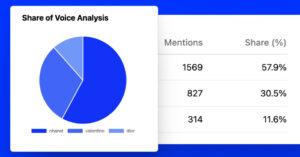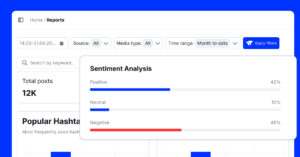Qu'est-ce que la notoriété de la marque ?
La notoriété d'une marque désigne la mesure dans laquelle les consommateurs connaissent les qualités distinctives ou l'image d'une marque particulière de biens ou de services. Il s'agit d'une mesure de la reconnaissance d'une marque par son marché cible et par la population en général.
Voici quelques points clés à comprendre sur la notoriété de la marque :
Reconnaissance ou rappel
La notoriété de la marque peut être divisée en deux types :
- Reconnaissance de la marque: Il s'agit de la capacité des consommateurs à confirmer qu'ils ont déjà été exposés à une marque lorsqu'on leur donne la marque comme indice. Par exemple, lorsqu'on leur montre un logo, ils peuvent immédiatement identifier l'entreprise ou le produit qu'il représente.
- Rappel de marque: Il s'agit de la capacité des consommateurs à retrouver une marque dans leur mémoire lorsqu'on leur donne une catégorie de produits ou un autre indice. Par exemple, si quelqu'un mentionne "fast-food", à quelle vitesse une personne peut-elle penser à "McDonald's" ?
Importance: Faire connaître une marque est souvent l'une des premières étapes de la commercialisation d'un produit ou d'un service, en particulier pour les nouvelles entreprises ou celles qui pénètrent de nouveaux marchés. Si les consommateurs connaissent une marque, ils sont plus susceptibles de la prendre en considération lors de la décision d'achat.
Renforcer la notoriété de la marque
Les entreprises ont souvent recours à diverses stratégies de marketing pour accroître la notoriété de leur marque, telles que la publicité (à la télévision, à la radio, en ligne, dans la presse écrite), le parrainage (événements sportifs, festivals, etc.), les relations publiques et la promotion de la marque. campagnes dans les médias sociaux.
Métriques
Il existe des moyens de mesurer la notoriété d'une marque. Enquêtes sur la notoriété de la marque peuvent poser des questions relatives à la mémorisation ou à la reconnaissance de la marque, tandis que les mesures en ligne peuvent porter sur les données relatives au volume de recherche d'une marque ou sur les mentions dans les médias sociaux. Les marques populaires utilisent souvent certaines des les meilleurs outils de marketing d'influence pour améliorer leurs campagnes et leurs mesures.
Actif à long terme
La notoriété d'une marque peut constituer un atout à long terme. Les marques bien connues bénéficient souvent d'une plus grande fidélité de la part des clients, peuvent obtenir des prix plus élevés et peuvent avoir un avantage concurrentiel sur le marché.
Sensibilisation au sommet de l'esprit (TOMA)
Il s'agit d'une forme particulière de rappel de la marque. Il s'agit de la première marque qui vient à l'esprit d'un consommateur lorsqu'il pense à un secteur d'activité ou à une catégorie de produits. Par exemple, si une personne pense immédiatement à "Nike" lorsque l'on évoque des chaussures de sport, alors Nike est la première marque qui lui vient à l'esprit.
La notoriété d'une marque consiste à créer une empreinte mentale dans l'esprit du consommateur. Plus cette empreinte est forte et positive, plus le consommateur aura tendance à penser à cette marque, à lui faire confiance et à l'acheter.












